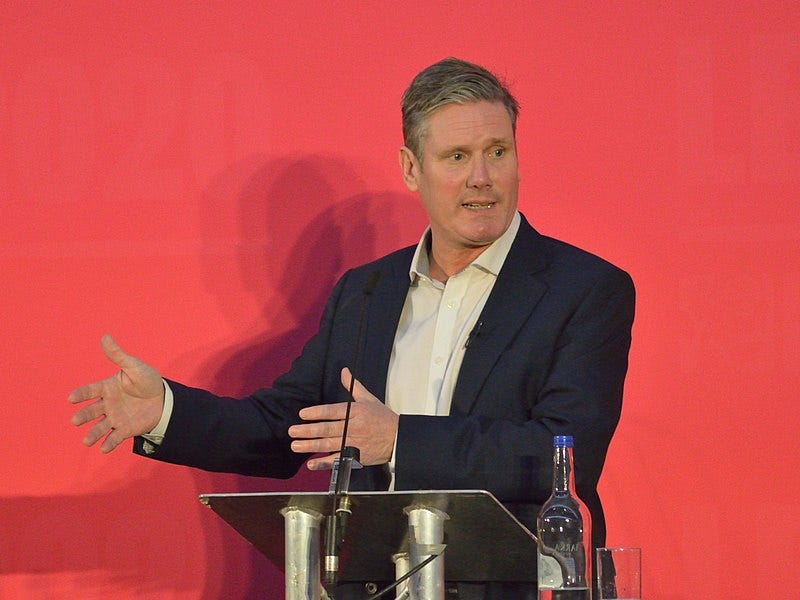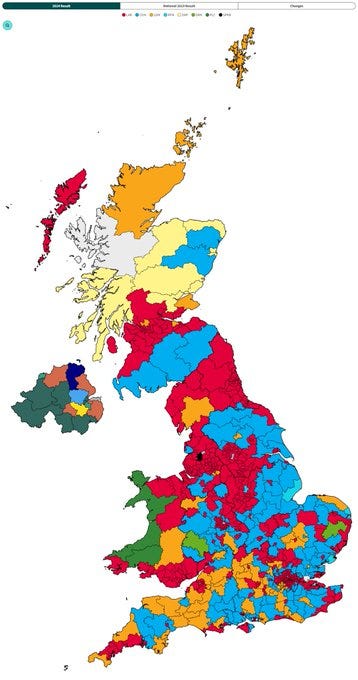UK Election Results
Labour's weak mandate and its unrealistic promises
Analysis
Labour has a weak mandate.
Labour won a total of 412 out of 650 seats. However, Labour’s absolute number of votes was just 9.69 million, compared to 10.27 million in the 2019 election, in which the Conservatives had won an 80-seat majority (with 43.6% of the vote). Labour Leader Keir Starmer received less votes than his supposedly unelectable predecessor, Jeremy Corbyn.
In this round of elections, Labour gained 33.7% of the vote, compared to 32.1% of the vote in 2019. All Prime Ministers since 1970 won with a larger share of the vote than Keir Starmer. This suggests that Starmer’s mandate is limited, despite his enormous parliamentary majority. Voters wanted to punish the Conservatives for failing to adhere to any kind of Conservative values, and for failing to implement their 2019 electoral promises.
Support for Starmer’s agenda is very limited
When asked to state in their own words why they were voting Labour, only 5% of those who planned to vote Labour mentioned support for Labour’s policies. This means that adventurous and unrealistic Labour policies around diversity, migration, Net Zero, gender and other deeply controversial policies will risk dividing the party, as constituents attack MPs over these topics that directly impact their living standards. This partly explains why the Labour Party is very keen to avoid discussing its specific policy plans.
Reform imposed itself as spoiler and kingmaker for the Conservative Party, but a deal between the two may not be forthcoming.
According to our calculations, there were 142 seats that Labour won where the vote tally from Conservatives and Reform exceeded the Labour vote. This does not mean that Reform cost the Conservatives these seats - most Reform voters wanted to punish the Conservatives for their failure on immigration, and many would have stayed home if Reform were not on the ballot. What this does mean, however, is that the defeat of the Conservatives is largely attributable to their failure on immigration, gender ideology, reducing taxes, and other policies supported by Reform.
Even though Reform only won four seats (albeit with 4 million votes, compared to the Conservatives’ 6.8 million and 121 seats), they have successfully imposed themselves as a spoiler for the Conservatives. The Conservatives have two options here: to side with the Liberal Democrats, who oppose new housing and industrial developments but support migration (and who have their own base separate from that of the Conservatives), or to work out a deal with Nigel Farage and Reform whereby the chastised Conservatives adopt Reform’s favoured policies. Given the failure of Boris Johnson, who was fully supported by Farage after Brexit, to curtail immigration, Farage’s price is likely to be very heavy. This risks keeping the Conservatives and the centre right in chaos until after the 2029 elections.
Labour suffers from a severe lack of talent, allowing the civil service to do as it pleases
Most of the Labour leadership lacks any private sector experience, or experience in senior roles in government even. They have never actually built anything or managed anything of importance. This shortage in skills and in practical experience is going to affect them badly. The Civil Service, especially given the influence of Sue Gray – Starmer’s Chief of Staff and a former Second Permanent Secretary in the Cabinet Office – will likely continue to do as it sees fit. The Civil Service has seen fit to maintain austerity, to reduce the functioning of the police to the bare minimum, to expand migration far beyond the capacity of the housing market or government services, and to fully embrace the DEI agenda. Labour will most likely not attempt to reverse these policies.
The Islamist bloc will pressure Labour Muslim MPs severely, damaging Labour’s relationships with other minority communities.
At least four Islamist MPs who fought Labour over the Gaza issue won seats in this election. They would have won three more constituencies had their votes not been split, and there were at least two more seats within reach. This demonstrates that, in Muslim-heavy constituencies, politics is changing. Muslims want their elected representatives to be concerned with their own priorities, which are often transnational, not British, and which often reflect a fundamentally different culture, faith, identity and sense of belonging. The four new Islamist MPs will use their perch in Parliament to rally their community – which has a different identity, values, and therefore sense of what is common and what is good. They will try to develop a political threat to other Muslim MPs to challenge their seats in future. This will in turn pressure Muslim MPs to push Labour to side more openly with Muslim causes. Hindus and Sikhs, for their part, will be alienated by this process. Sectarian politics has fully arrived in Britain.
Commercial Impact:
Austerity or inflation?
The UK’s debt to GDP ratio is 100%. The government’s deficit is 4.4% of GDP. The Labour’s government scope for new spending is extremely limited – which is why Labour abandoned its plans to make large investments in renewable energy. Further taxes will be highly unpopular, given that already, the tax burden in the UK is the highest it has been since WWII. The alternative is to spend borrowed money, exacerbating inflation and spooking markets. The new government does not have any good options here. Labour has committed to higher defence spending, to more police, teachers and NHS nurses, but also to avoiding new taxes and expanding the deficit. Something will have to give. This will quickly end Labour’s honeymoon with the voters.
Planning is a key challenge for Labour
Seats won from the Conservatives, the Liberal Democrats or the SNP would be at severe risk if Labour were to liberalise the UK’s arcane and cumbersome planning regime, which prevents the building of enough housing and obstructs private investment. Labour most likely has a narrow window during its first year to eighteen months in office to make major reforms to the planning system, thereby revoking the authority of councils to keep blocking new housing, commercial and industrial developments. Labour would hope that, with an election still three to four years away, the economic benefits of planning reform would convince voters not to turn against the party. If Labour misses this window, it will be unlikely to follow through with any kind of planning reform. Furthermore, Labour may reform the planning process while also increasing Net Zero and other environmental requirements, devaluing the reforms.
Great British Energy’s plans will likely raise energy costs if implemented.
Labour plans on establishing Great British Energy, a utilities company that relies exclusively on renewable energy. However, renewable energy is unreliable – the wind does not always blow, the sun does not always shine, and the power generated is usually much lower than installed capacity. Where energy production is at installed capacity, this often happens during times where demand is not particularly high, requiring investment in storage. That means that utilities must maintain both, conventional energy and renewable energy and storage facilities, raising their costs.
As such, Labour’s attempts to boost renewable energy will likely increase the UK’s energy costs further. The UK’s energy costs are already the highest in the EU, and are considerably higher than in the United States, let alone China. British industry is likely to suffer even more if Labour attempts to implement its Net Zero policies.
Immigration will further strain public services at a time of austerity, raising the risk of strikes.
For some reason, intelligent people who normally understand supply and demand suspend their faith in market dynamics when it comes to immigration. Since most immigration to the UK is not by workers, the result is obviously going to be more pressure on public services, the benefit system, the healthcare system, and housing, harming the poorest strata of society while limiting wage rises.
Labour is unlikely to reduce immigration numbers significantly, meaning that the strain on public services – and the housing market – will continue to rise. As such, we anticipate that, under this Labour government, the deterioration of public services will continue. Additionally, unions, Labour’s traditional supporters, likely have their own high expectations of Labour siding with them. As Labour restricts spending due to high existing deficits and public debt, and fails to raise living standards, the prospect of renewed strikes in the public service sectors will increase.



"For some reason, intelligent people who normally understand supply and demand suspend their faith in market dynamics when it comes to immigration."
Very politely put.
Excellent as always Sir.